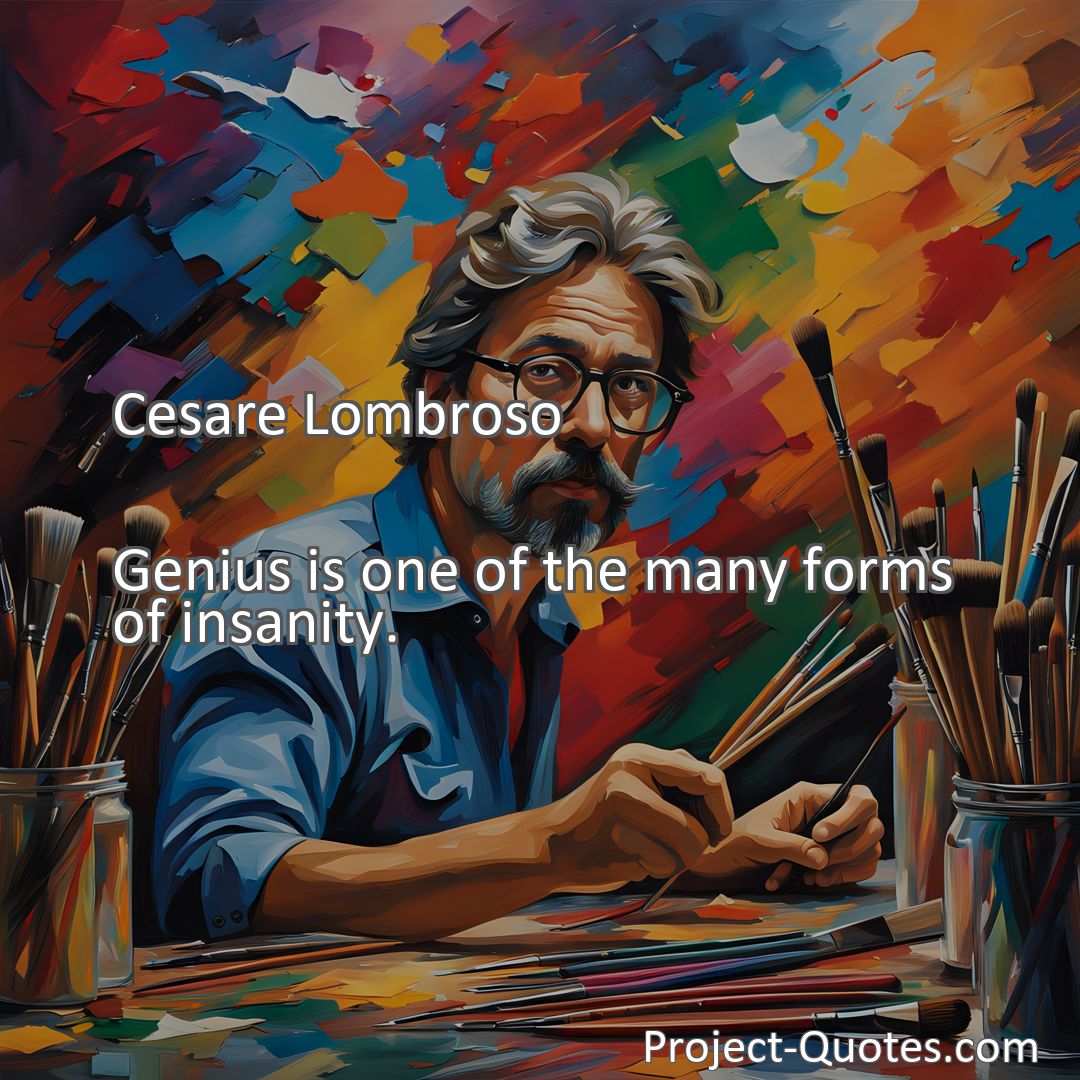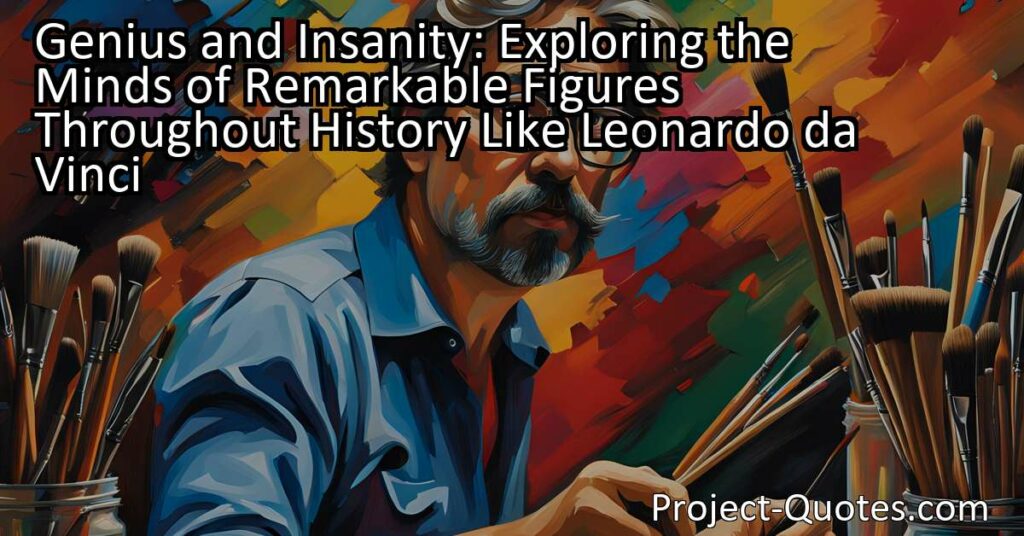Genius is one of the many forms of insanity.
Cesare Lombroso
Explore the captivating minds of historical figures like Leonardo da Vinci, Albert Einstein, and Marie Curie to uncover the intricacies of genius and insanity. While these extraordinary individuals have forever shaped our world with their exceptional contributions, the question remains: Can brilliance and madness coexist within the same realm? Delve into the depths of human brilliance and madness to unravel the complex relationship between remarkable minds and mental health.
Table of Contents
Meaning of Quote – Genius is one of the many forms of insanity.
Have you ever heard the saying that genius and insanity are closely related? Well, it seems that Cesare Lombroso, an Italian criminologist and physician, shared this same belief. Lombroso famously proclaimed that “genius is one of the many forms of insanity,” suggesting that individuals with exceptional intellect and creativity might possess certain traits associated with mental instability. As intriguing as this notion may be, it begs the question: How can genius and insanity coexist within the same realm? To answer this, let us embark on a journey exploring the depths of human brilliance and madness.
Before delving deeper into the realms of genius and insanity, it is essential to have a clear understanding of what these terms truly mean. Genius is often used to describe someone with outstanding intellectual or creative abilities. Think of remarkable minds throughout history like Leonardo da Vinci, Albert Einstein, or Marie Curie, whose exceptional contributions to various fields have forever shaped our world. On the other hand, insanity refers to a state of mental illness, characterized by behavior that deviates from social norms and may significantly impair one’s ability to function in daily life. Now, to many, these two concepts seem mutually exclusive. How can someone who embodies brilliance also possess traits associated with madness?
Lombroso’s theory is rooted in the idea that genius and insanity share certain commonalities, particularly in terms of personality traits and behavioral tendencies. He proposed that both geniuses and the mentally ill exhibit unconventional thinking patterns, emotional intensity, and heightened sensitivity to their surroundings. While these traits are advantageous for artistic creation or scientific breakthroughs, they can also lead individuals towards uncharted territories of psychosis, depression, or anxiety. According to Lombroso, the frenetic state of mind that drives genius can easily push individuals over the edge, plunging them into a world of madness.
Despite Lombroso’s claim, it is important to approach his theory with skepticism. After all, genius is an elusive concept, and determining who qualifies as a genius is subjective. There is no universally accepted definition of genius, leaving ample room for interpretation and debate. Moreover, the notion of “insanity” itself is complex and multifaceted, encompassing a wide range of mental illnesses that cannot be condensed into a single definition. Therefore, it is crucial not to generalize or stigmatize individuals with mental health conditions simply because they possess extraordinary abilities.
While the relationship between genius and insanity is far from being fully understood, many psychological studies have explored the psychological and neurobiological aspects underlying genius and mental illness. In recent years, researchers have uncovered intriguing connections between psychiatric disorders, such as bipolar disorder and schizophrenia, and creative genius. For instance, studies have shown that individuals with bipolar disorder often exhibit higher levels of creativity during their manic phases. This heightened creativity may be linked to altered brain functioning, particularly in the prefrontal cortex and limbic system, which govern cognitive and emotional processes.
Similarly, individuals diagnosed with schizophrenia have been found to display greater levels of creativity compared to the general population. Although this mental disorder poses significant challenges in daily life due to symptoms like delusions and hallucinations, it can also facilitate the emergence of unconventional thinking. Scholars believe that the cognitive disorganization and divergent thought patterns characteristic of schizophrenia can lead to truly groundbreaking insights and artistic expression in some individuals.
These findings lend support to Lombroso’s proposition that genius and insanity are intertwined, at least in terms of certain cognitive processes. However, it is crucial to note that not all geniuses experience mental illness, and not all individuals with mental illness exhibit genius. The link between the two is far from absolute and remains a topic of ongoing research and debate in the scientific community.
One possible explanation for the connection between genius and insanity may lie in the nature of brilliance itself. Extraordinary intellect often comes hand in hand with a heightened sensitivity and perception of the world. Geniuses tend to observe details and connect seemingly unrelated concepts in ways that elude the average mind. While this ability is instrumental in generating innovative ideas and discoveries, it can also make geniuses more susceptible to external stimuli, leading to mental states of anxiety or hypervigilance.
Moreover, the burden of genius can be overwhelming. Many exceptional individuals face tremendous pressures to continuously produce groundbreaking work or ideas. This expectation can take a toll on their mental well-being, contributing to the development of anxiety disorders or depression. The relentless pursuit of perfection, coupled with societal isolation, can further compound the challenges experienced by geniuses, potentially pushing them towards mental instability.
Nevertheless, it is important not to romanticize or glorify mental illness as a prerequisite for genius. In reality, mental illness is a deeply complex phenomenon that can cause significant suffering to those affected. It is essential to treat mental health conditions with compassion, understanding, and appropriate medical interventions, rather than seeing them as a necessary evil for extraordinary talents to flourish.
In conclusion, Lombroso’s assertion that genius is one of the many forms of insanity offers a thought-provoking perspective on the profound connection between exceptional intellectual abilities and mental health. While scientific research provides glimpses into the potential psychological mechanisms underlying this association, the true nature of genius and its relationship with insanity remains elusive. The key lies in recognizing that each individual is unique, and mental illness should not be romanticized as a prerequisite for extraordinary intellect. Instead, it is paramount to foster a society that values and supports diverse expressions of genius, prioritizing mental well-being alongside intellectual brilliance.
I hope this quote inspired image brings you hope and peace. Share it with someone who needs it today!


